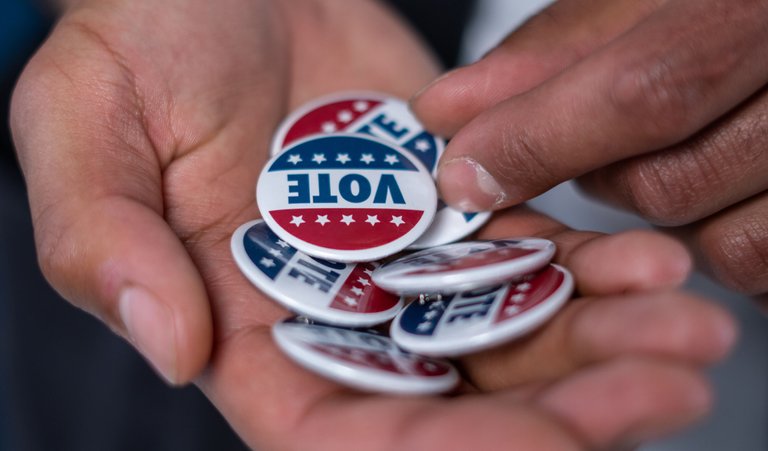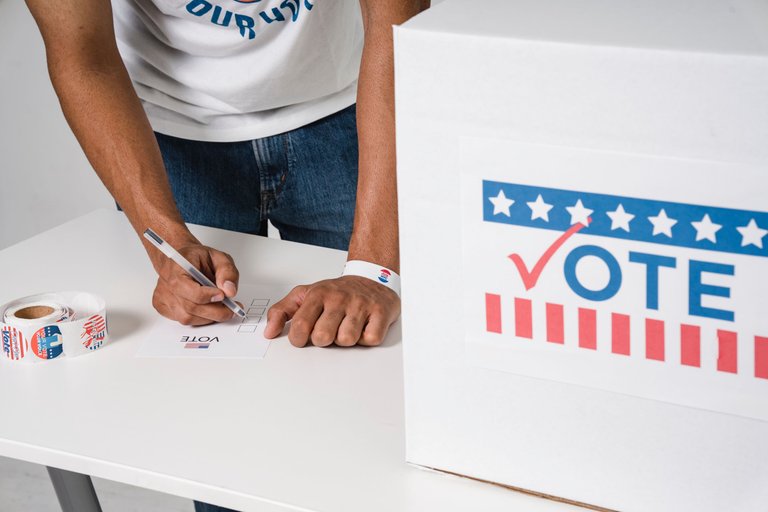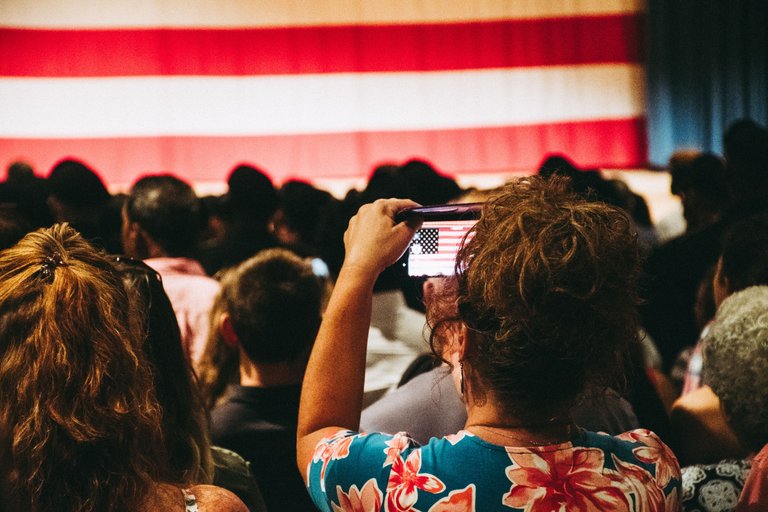Teaching Civics By Example
The first couple of weeks in November is an exciting time as a citizen of the United States.
Photo by cottonbro studio

First, we participate in something commonly referred to as Election Day. Election Day occurs on the Tuesday after the first Monday in November (the Tuesday that falls on or between November 2 and November 8). American citizens who have registered and are 18 years or older are allowed to vote.
Second, we wait for the results. Although it seems like the results of an election should be easy to determine (especially with all of the technology available), it can take days or even weeks before we know all the results.
CIVICS - matters related to the rights and duties of citizens
As parents, we have a great opportunity to train our kiddos as we exercise our civic duties. The following points, asked as questions, explain some important principles related to voting and elections.
Who can vote?
As I mentioned earlier, some conditions must be met to vote. To be eligible to vote, a person must:
- be 18 years old or older by election day
- be an American citizen
- meet residency and registration requirements
The above are general guidelines that apply to federal elections, but as is the case in many situations, you will find some expectations. For example, in some local elections, 16-year-olds and/or non-citizens are allowed to vote.
Millions of Americans who meet the guidelines above are still not allowed to vote. Anyone serving a prison sentence due to a felony is not permitted to vote.
Upon exiting prison or jail, it is challenging for many to regain voting eligibility. American sentences who live overseas often experience challenges related to voting due to residency concerns. So do college and university students who have moved away to complete their education.
Seven of the last 17 amendments added to the United States Constitution expanded the voting rights of American Citizens. Over time, these amendments have granted the right to vote to eligible citizens regardless of gender or ethnic background.

Photo by Sora Shimazaki
What are people voting for?
Now that we understand who can vote, we need to discuss more about what people are voting for.
First, it is important to understand that voting happens at various levels. These geographical levels are commonly referred to as:
- Local Elections
- applies to the important matters related to the city and county where a voter lives
- usually occurs every year
- State Elections
- applies to the important matters related to the state where a voter lives
- usually occurs every year
- Federal Elections
- applies to the important matters that impact every citizen of the United States
- also referred to as the national elections
- usually occurs every two years, and only on even years (for example, 2022)
Second, it is crucial to understand the types of things voted for - people and policies.
- President/Vice President - executive leaders of the United States
- U.S Congressional Members - representative leaders who serve at the national level in either the Senate or House of Representatives
- Governor/Lieutenant Governor - executive leaders of each state
- State Congressional Members - representative leaders who serve at the state level
- Mayor - executive leader of each city
This is not an exhaustive list of elected officials.
In addition to voting for people to serve in critical governmental roles, American citizens often vote for important policies that affect the United States and its people.
For example, my state had a vote on whether or not to allow recreational drug use.
Why is voting important?
We have already discussed that voting is a right and to whom the right has been granted.
Voting is also a civic responsibility. Through voting, American citizens can either directly or indirectly impact their individual lives and the communities/states they live. When we vote for people, we choose men or women that we believe represent what is most important to us. When we vote for policies, we decide what we want and don't want.
When officials who the people have elected do not represent their constituents well, those elected officials run the risk of being replaced by newly elected officials.
CONSTITUENT - a person who is entitled to select representative
An elected official was selected by the people to work for and serve on behalf of the people. As voters, we use our voting power to make changes directly and indirectly. This is a great responsibility.
Why are the policies being voted on so complicated?
The policies that the people will vote on are usually complex and challenging to understand. As a voter, reviewing the different items on a ballot in advance is important to know how you should vote.
BALLOT - the paper used to cast a secret vote
Remember that politicians, not everyday people, usually write the items being voted for. Be sure to do your research to properly understand what you are voting for.
POLITICIAN - a person who has experience in government or has a profession related to government
Ignorance may be bliss in many situations, but regarding voting and elections. As citizens, we need to be well informed to make the decisions we believe are best for our families, cities, states, and countries.
Will our voice be heard?
In the United States, this question is being asked more and more often. In my opinion, this is a critical question.
Let's support and encourage other people to vote even when we know that their interests and concerns do not match our own. When people feel that their vote no longer matters, they stop voting. And when people stop voting, they do not have a voice in the matters most important to them.

Photo by Brett Sayles
This question serves as an umbrella for more questions:
- Are the challenges placed upon groups of voters (intentional or not) that discourage or suppress voting?
- Does it matter if a person votes one way if the assumption is that most voters are voting the opposite way?
- Can technology be trusted to count votes accurately?
- Will voting officials and supervisors use their power to impact the voting process?
- What steps are being taken to ensure that only eligible votes are counted?
How do we model civics by example for our children?
I believe that parents (aka home educators, regardless of our preferred education style) should speak about and model civics to their children.
As this can be a challenging topic, we need to make sure that we are in the know about the important issues impacting our families. Instead of gatekeeping, we should openly discuss these important matters with the people who are most important to us, our children.
Not only should we talk about voting, elections, and politics with our kiddos, but we should also invite them to directly and indirectly participate.
Some of the best teaching opportunities happen through modeling. I missed an excellent opportunity to teach my kiddos on election day. I only realized this after I cast my vote. As I walked out of the building, I saw a man and his young daughter enter. Immediately, bells and fireworks started going off in my head. Why did I not invite one (or more) of my kids to come with me?
Even better than talking about voting is showing the steps and the process.
- showing my ID
- signing in
- receiving a ballot
- filling in those tiny circles
- standing in line
- putting my ballot in the box
- (optional) grabbing an "I voted" sticker
I missed the boat on that one. But there are still other changes throughout the year for my family and me to engage in politics. The following are just a few examples.
- visit our local or state representatives
- join local political organizations that align with our principles and values
- sign petitions and invite people to do the same
PETITION - a piece of paper that is signed by many people who support a common concern or issue
I encourage you to find ways to both explain and model these principles to your children.
Final Thoughts
I want to hear from you. Answer the following in the comments section.
- Have you ever taken one of your kiddos with you when you voted?
- How would you feel if one of your children wanted to be a politician or elected official?
- What resources do you use to best understand the policies you are voting for?
Thanks for stopping by!
@sumatranate
I would like to answer number 2. I won't agree that my child will enter into politics. I don't want her to jeopardize her life into that position.
@missleray - Thank you for commenting on my post.
I understand your concern about having a child who wants to be a politician. I have similar concerns.
My oldest daughter has been thinking a lot about what she wants to do as a profession. I have been surprised by some of her ideas, most notably being a lawyer or joining the military. Although I am struggling, I want to help her be prepared for whatever she chooses to do. I have taught my daughter to serve others. If this is the way she is meant to serve, then I want to support her, even though I worry about how her choices could impact her life.
I have done many hard things in life that my parents probably did not want me to do. Looking back, I know that I have grown a lot as I faced those challenges. What other people thought was going to jeopardize my life became something that helped me grow into the person I am today.
Keep talking about these important topics with your children. You will not regret it!
I will..☺️
You're welcome☺️ and thank you☺️
Your post is excellent @sumatranate I love the idea that you express to us by emphasizing that parents are home educators. And as such we should not be guardians but discuss problems with the people who matter most to us 🤗 Our Children 🤗
@graciadegenios - I am glad you enjoyed my post. I truly believe that all parents are home educators, even if they do not choose homeschooling or unschooling for their kids.
Sometimes we need to step in as guardians to protect our kiddos. But there are times when we need to pass along knowledge and have meaningful conversations so that our children can learn how to do things for themselves. Finding the right balance is very challenging.
Thanks for leaving a comment. Have a blessed day!
I totally agree with you. Protect but teach for when we are already.
Here in my country it is mandatory to send children to school. But there are many details that are lost due to the day-to-day responsibilities of parents.
Educating at home should always be important above any situation. A mission as important as voting for your country is sometimes left in oblivion.
Thank you for sharing the importance of the topic.
https://twitter.com/799686987217305600/status/1591887101842567169
The rewards earned on this comment will go directly to the people( @sumatranate ) sharing the post on Twitter as long as they are registered with @poshtoken. Sign up at https://hiveposh.com.